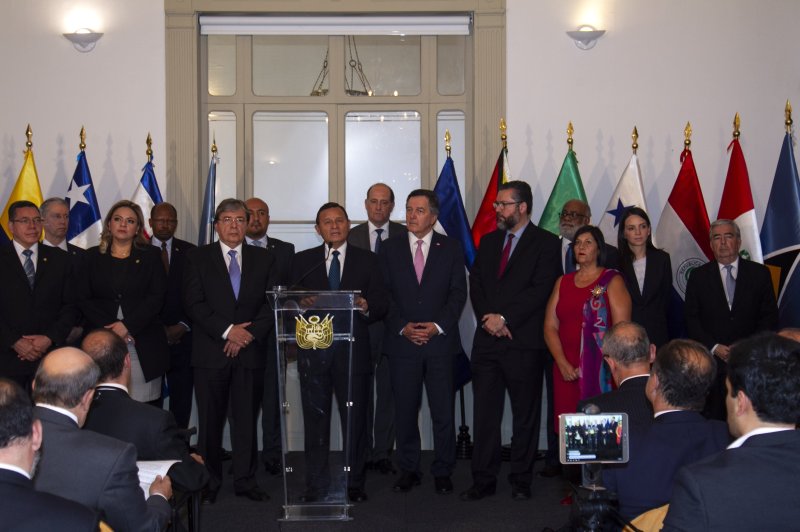Foreign ministers of 13 nations, who on Friday urged Venezuelan President Nicolas Maduro to abstain from swearing-in for a new term Thursday, will deny access to high-ranking Venezuelan officials. Photo by Eduardo Cavero/EPA-EFE
Jan. 9 (UPI) -- Thirteen nations from the Group of Lima have agreed to deny entry to high-ranking officials of Venezuelan President Nicolas Maduro's government.
Colombian Foreign Minister Carlos Holmes said the decision was made after a Friday meeting of the group in Peru, excluding Mexico, Venezuela's El Universal newspaper reported late Tuesday.
The group was established in 2017 by Argentina, Brazil, Canada, Chile, Colombia, Costa Rica, Guatemala, Guyana, Honduras, Mexico, Panama, Paraguay, Peru and Saint Lucia. Representatives met in the Peruvian capital to discuss the political, economic and humanitarian crisis in Venezuela. Mexico did not subscribe the final resolution.
At the end of the Friday meeting, the Peruvian Foreign Ministry issued a joint resolution of the Group of Lima -- in which Mexico was not included -- asking Venezuelan President NIcolas Maduro to abstain from assuming the presidency, to transfer power to the National Assembly and to call for new elections.
At the time the original group was formed, Enrique Pena Nieto was president of Mexico. President Andres Manuel Lopez Obrador, who is more liberal, took office in December.
The group tried to coordinate a position ahead of Maduro's Thursday swearing-in ceremony. Several nations, including the European Union and the United States, have not accepted the process that re-elected him, while some countries, including China and Russia, have.
The resolution said that Group of Lima countries would, depending on internal legislation, take action to prevent the entry of high-ranking Venezuelan officials to their territories and evaluate lists of Venezuelan people and organizations with which transactions will be banned.
During the Friday meeting the representative of Mexico, the deputy secretary for Latin America and the Caribbean Maximiliano Reyes, said his government opposed interference and isolation, and intended to continue diplomatic relations with Venezuela.
The Venezuelan government on Tuesday rejected the "interference" of the Group of Lima as not recognizing the "legitimate authorities" of Venezuela. Maduro tweeted that the group was "a cartel." He has repeatedly said the group is acting under pressure from the United States.
Maduro will assume a new term in a chaotic situation, not just marked by hyperinflation and sharply declining productivity, but also extreme violence and a massive exodus.
Last year, Venezuela became Latin America's most violent country, with more than 23,000 violent deaths -- of which 7,523 occurred as citizens resisted authority, according to a tally of a non-government organization.
A chaotic economic situation has created shortages of food and medicine and has contributed to the exodus of 3 million Venezuelans in recent years, according to the United Nations.
The country's oil production, traditionally the main source of revenue with the world's biggest crude reserves, has declined to historic lows.















